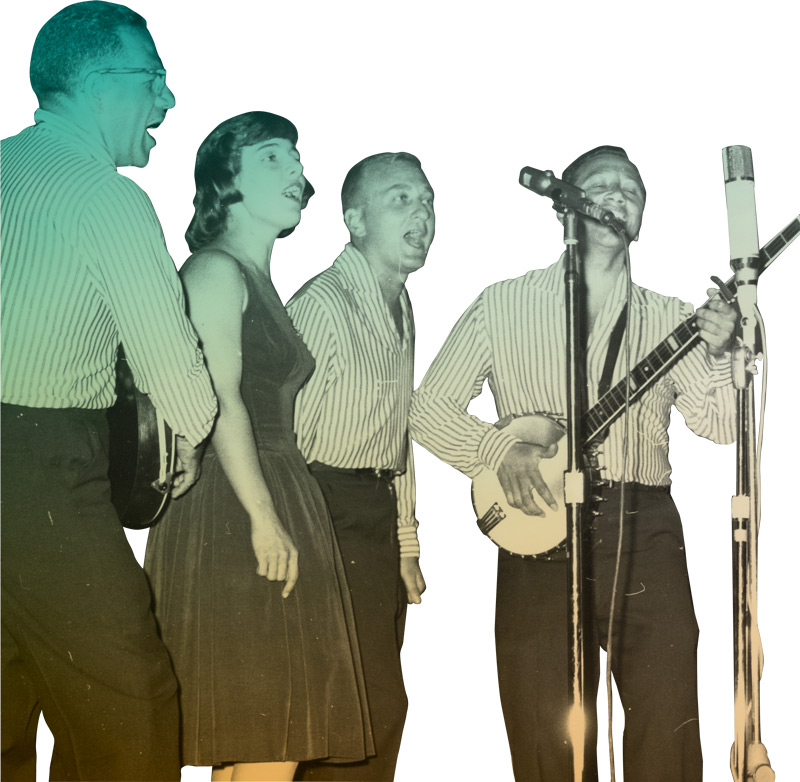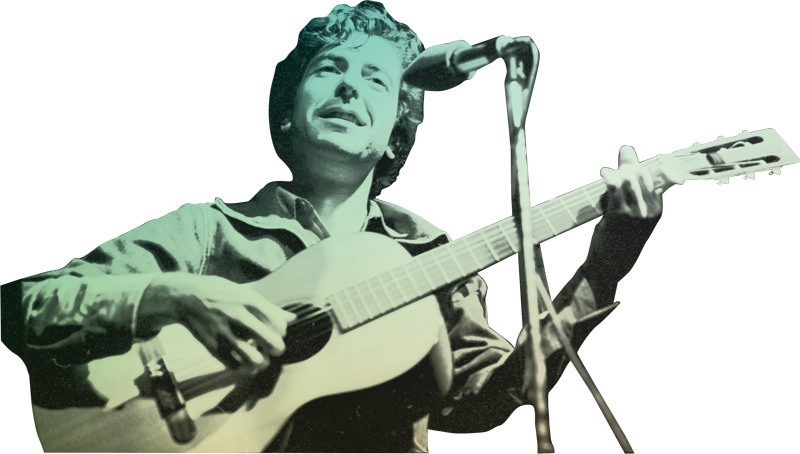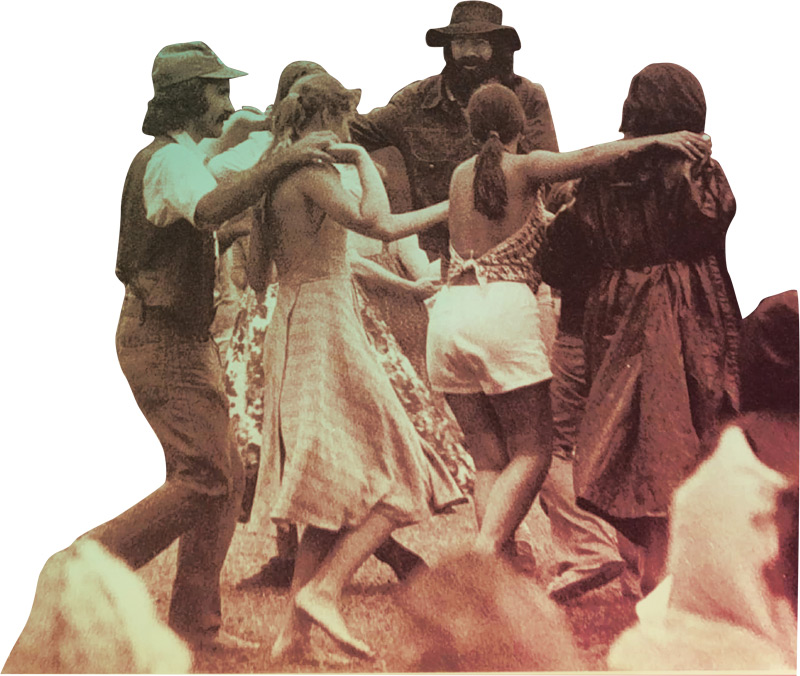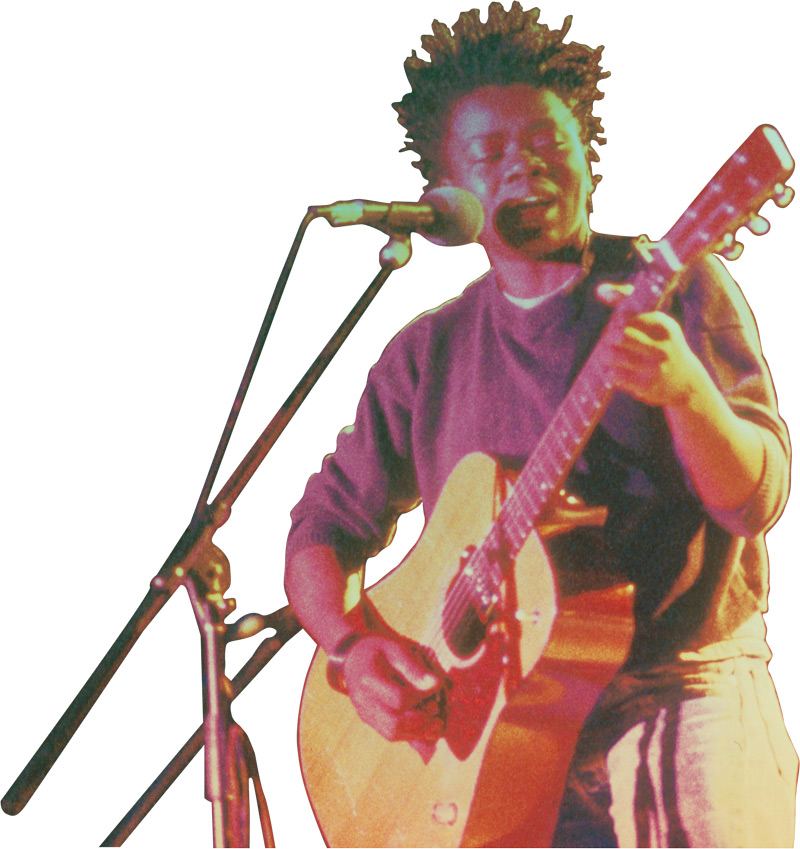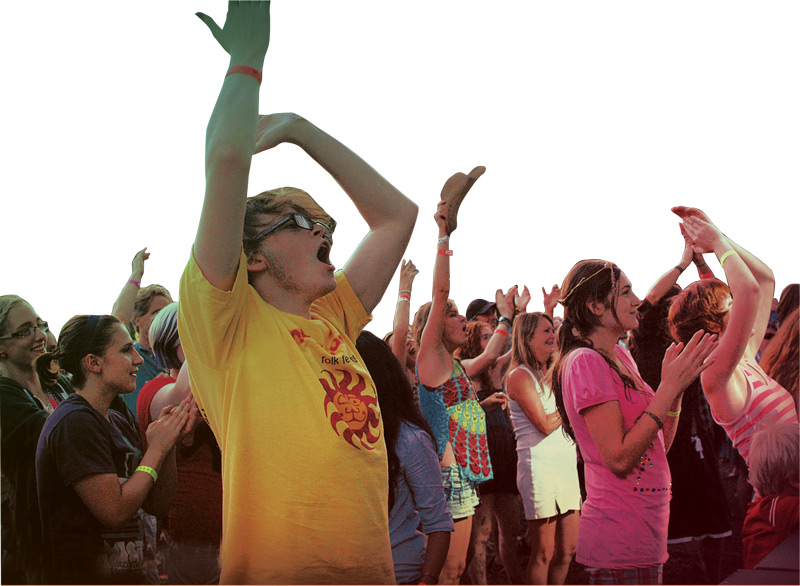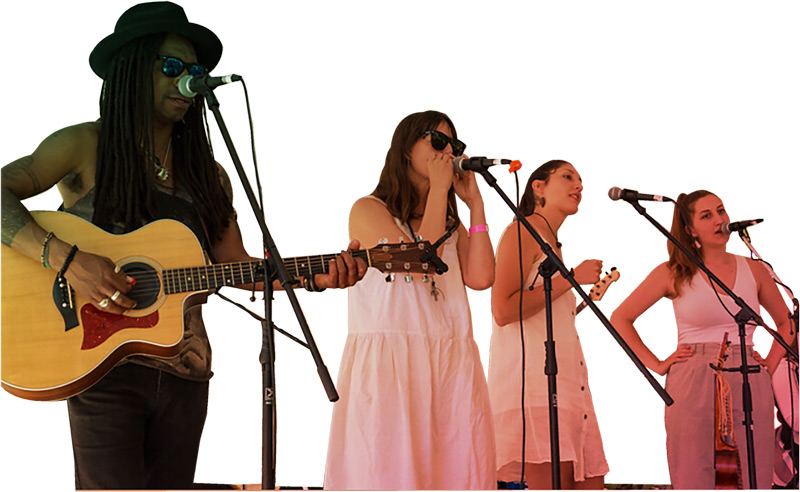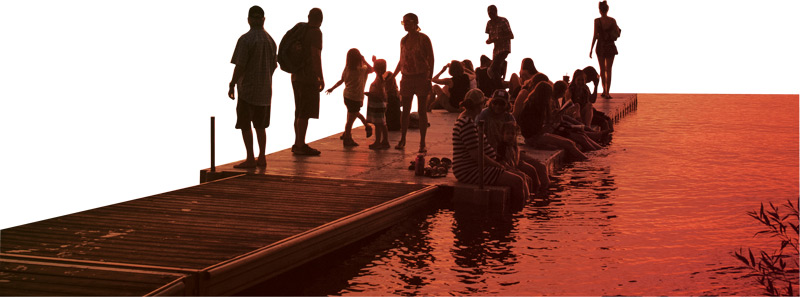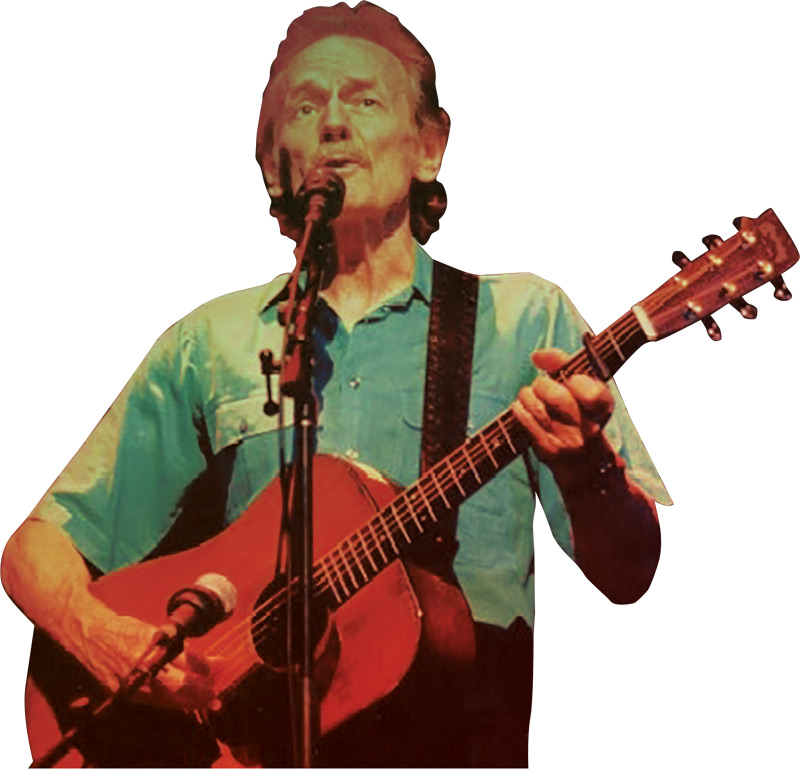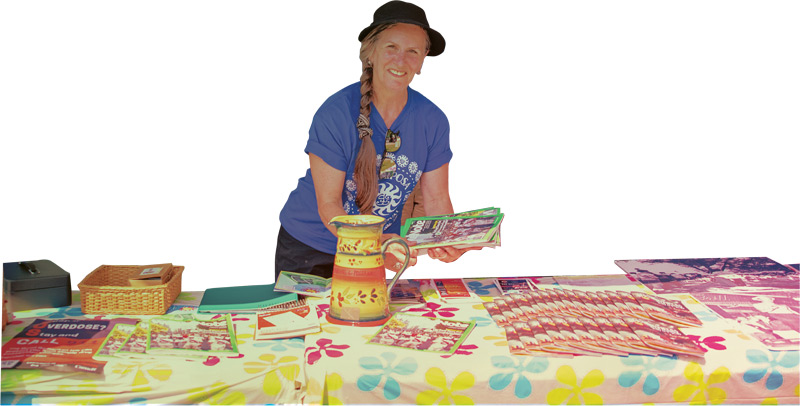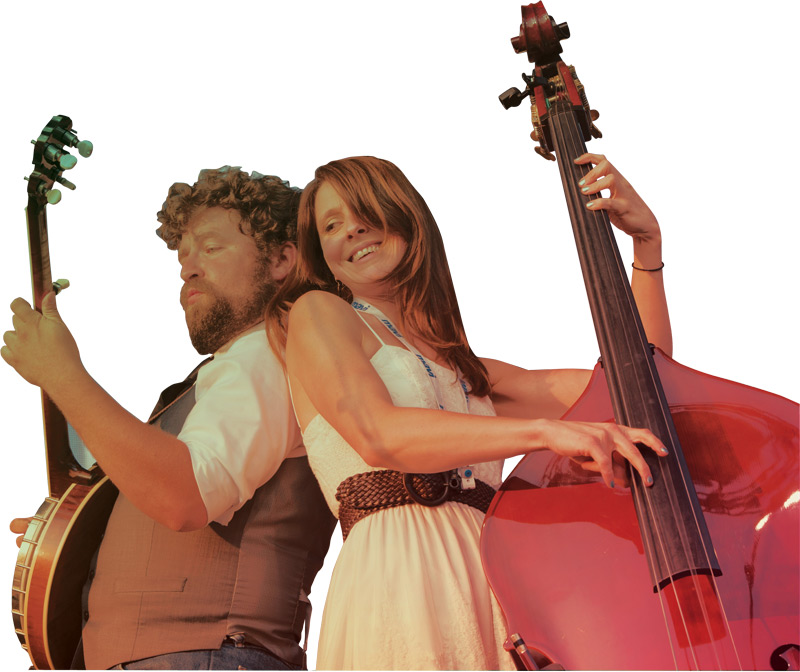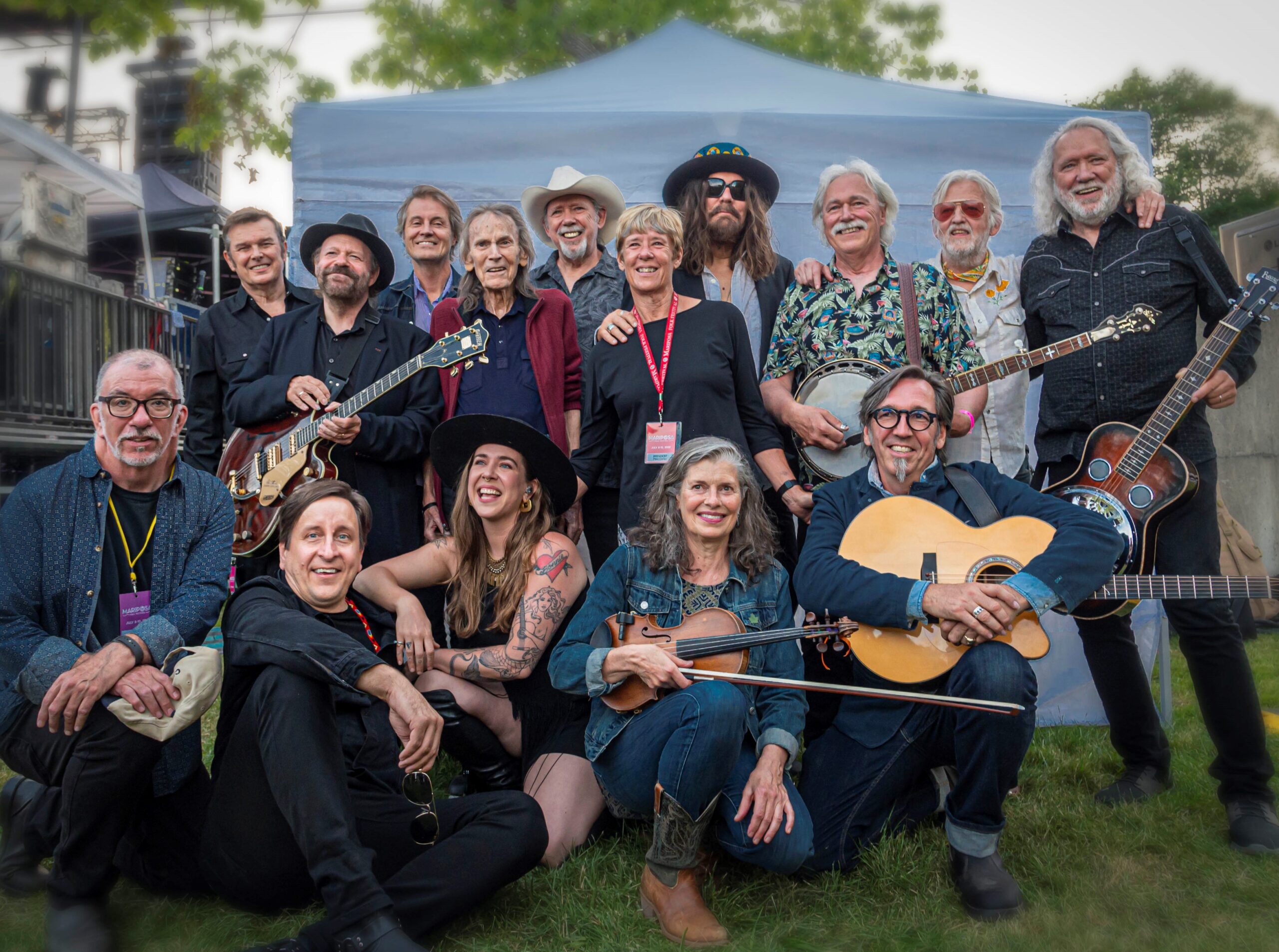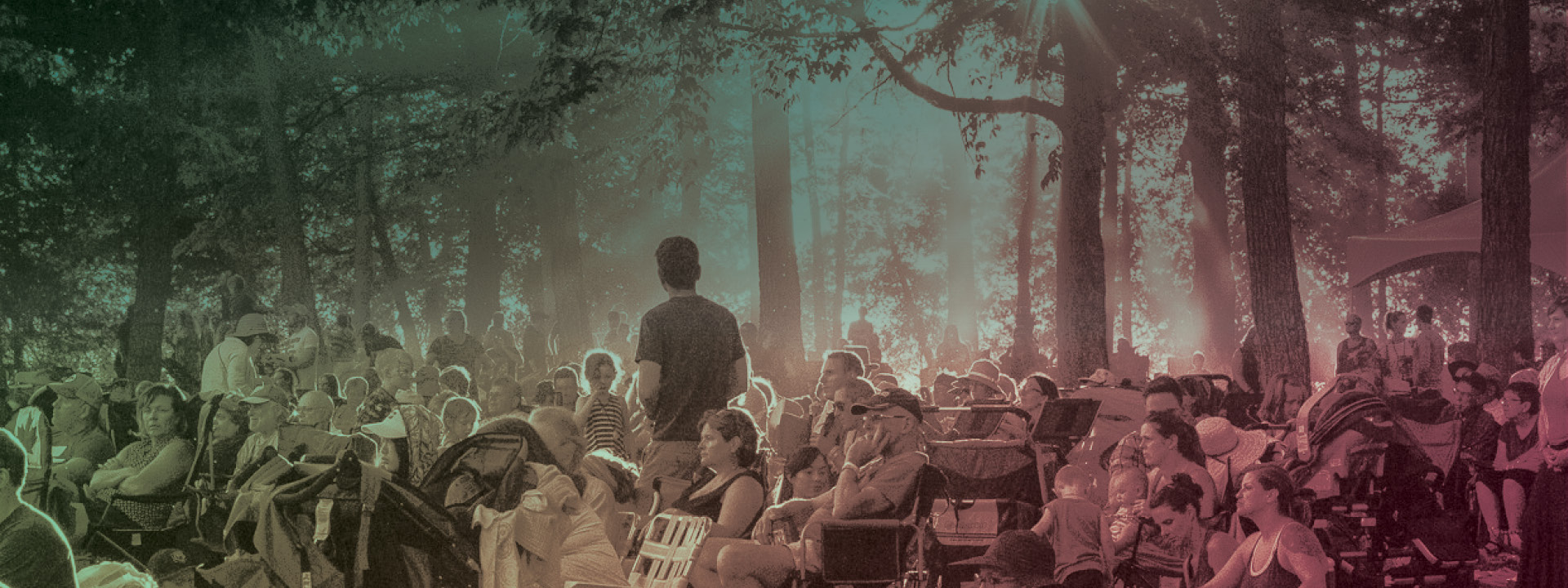
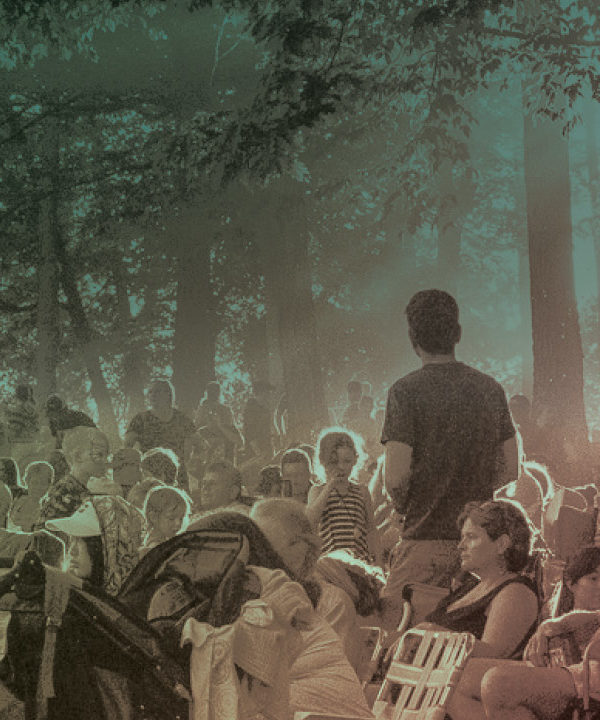
Our Stories
Then & Now
Leslie Merklinger discusses photographer Edwin Gailits’ experiences at the early Mariposa Folk Festival, where he captured rising folk stars like Joni Mitchell, Steve Goodman, Gordon Lightfoot and Bob Dylan. Edwin reflects from the historical 401 Richmond studios on the profound impact of his photographs from this influential music event and shares memories of his adventures.
Early Years 61-64
Mariposa Folk Festival was the brainchild of Ruth Jones, an Orillia resident and folk music enthusiast who rallied her local community and Toronto contacts to bring the first festival to life in 1961. With a lineup of established and emerging artists that included The Travellers, Jacques Labrecque, Bonnie Dobson, and Ian Tyson and Sylvia Fricker, Mariposa attracted an estimated 5,000 folk lovers to Orillia that year.
By the third festival in 1963, Mariposa was the place to be. The town’s resources were overwhelmed and celebration tipped into debauchery as drunken revellers ransacked streets, cars, and businesses. Ten days after the festival closed, the town council passed a resolution banning Mariposa from Orillia.
In 1964 organizers planned to increase security and hold the festival on a farm in nearby Medonte Township. At the last minute a court injunction barred the festival. Mariposa scrambled for a new location, ending up in Toronto’s Maple Leaf Stadium. Crowds were low and weather rainy, but audiences were wowed by incredible performances from the likes of Mississippi John Hurt, Gordon Lightfoot, and Buffy Sainte-Marie. Despite the challenges, the 4-year-old folk festival had survived.
Building Years 65-67
Organizers of the 1965 Mariposa Folk Festival focused on ensuring crowd control and securing political approval. A $1,000,000 insurance policy against property damage helped convince Albion Township leaders to allow the festival to go on at Innis Lake. Festivalgoers wended their way to the site along a gravel road to see headliners Ian & Sylvia play “Four Strong Winds.” Also performing were Gordon Lightfoot, John Hammond, the Country Gentlemen, Phil Ochs, and the young singer-songwriter artistic director Estelle Klein stumbled on in a coffee house and invited to Mariposa despite an already-full lineup: Joni Anderson, singing her classic songs “Circle Game” and “Urge for Going.”
Coming of Age 68-84
In 1968 Mariposa moved to Toronto Island. Canadian singer-songwriter Murray McLauchlan redesigned the festival logo with the now-iconic smiling-face sun, and the festival continued to showcase a diverse range of talent. Over its 12 years on the island, performers and visitors included Joan Baez, James Taylor, Taj Mahal, Bruce Cockburn, Joni Mitchell, Bob Dylan, Neil Young, Leon Redbone, and Gordon Lightfoot. Mariposa became the place for exceptional music and a free-spirited experience. The festival introduced world music, created a children’s and Native People’s area, and established a year-round program called Mariposa in the Schools.
But in 1980, with interest in folk music waning, Mariposa left Toronto Island and faced several years of low sales, debt, and cancelled festivals. By 1983 there were rumours that the once-thriving festival could be ending for good.
Strange Brew 86-90
Financial need can make for strange bedfellows. In 1985 the Mariposa Folk Festival turned 25 and things were looking up. Although the festival was still in debt, Molson’s Brewery had put together a sponsorship deal that included adding Mariposa to the company’s annual summertime lineup at Molson Park in Barrie. Only 90 kilometres from Toronto, with space for multiple stages, plenty of parking, and on-site camping, the park seemed like the perfect spot for the festival. Plus there were more than enough volunteers to be found in arts-friendly Barrie.
Stops Along the Way 91-99
 Throughout the 1990s, the festival struggled with deficits, underwhelming attendance, and bad weather—which included a June snowfall. But Mariposa continued to reinvent itself with new visions and new approaches. The first was to move back to Toronto after five years in Barrie, mounting the 1991 festival at Ontario Place. The following year, daytime activities took place on Toronto Island and evenings concerts in bars and venues across the city. By 1996 the festival was embracing the “spider plant” approach, partnering with different communities for smaller festivals. The first one, in Bracebridge, was moderately successful and was repeated twice more. The second, in Cobourg, lost too much money and ended after one year. Despite an enthusiastic volunteer base and a lot of hard work, by the final year of the decade, Mariposa had dwindled to a one-day affair in Toronto’s Parkdale neighbourhood — former artistic director Richard Flohil remarked that it wasn’t really a Mariposa Festival at all.
Throughout the 1990s, the festival struggled with deficits, underwhelming attendance, and bad weather—which included a June snowfall. But Mariposa continued to reinvent itself with new visions and new approaches. The first was to move back to Toronto after five years in Barrie, mounting the 1991 festival at Ontario Place. The following year, daytime activities took place on Toronto Island and evenings concerts in bars and venues across the city. By 1996 the festival was embracing the “spider plant” approach, partnering with different communities for smaller festivals. The first one, in Bracebridge, was moderately successful and was repeated twice more. The second, in Cobourg, lost too much money and ended after one year. Despite an enthusiastic volunteer base and a lot of hard work, by the final year of the decade, Mariposa had dwindled to a one-day affair in Toronto’s Parkdale neighbourhood — former artistic director Richard Flohil remarked that it wasn’t really a Mariposa Festival at all.
Return Home 2000 Onward
After a 37-year absence from Orillia, Mariposa Folk Festival returned in 2000 on a three-year trial basis. The homecoming was a resounding success, paving the way for Mariposa to stay in its new home. While the festival has experienced challenges during the two decades since, compared to Mariposa’s checkered past it has been a period of relative calm and stability, and in recent years attendance has hovered around maximum capacity. During this period there have been programming innovations and significant organization successes. As it enters its seventh decade, Mariposa Folk Festival is taking nothing for granted and continues to strive for greater artistic and cultural relevance.
Musical Workshops
It’s been said that Estelle Klein, the famous artistic director of Mariposa through the 1960s and 1970s, invented the concept of the musical workshop. She paired individual musicians on small stages—sometimes in unexpected combinations—to play songs on a chosen theme. Most knew to join in with their fellow performers. Often the results were incredible, never-to-be-repeated sessions that awed audiences and players alike.
Nearly every festival in Canada copied the idea. From Vancouver and Edmonton to Stanfest and Lunenburg, the musical workshop continues to be a staple of folk festivals across the country.
Festival Vibes
From the beginning, the magic of the Mariposa Folk Festival has been rooted not just in arts and music but in the festival vibe: the positive, welcoming energy that permeates a Mariposa festival weekend. The festival has always striven for cultural inclusivity and artistic diversity, featuring Indigenous artists as early as 1964, and including storytelling, painting, and dance among the art forms celebrated.
Opportunities for interactive engagement come in the form of workshop presentations, craft areas, and interactive stages where festivalgoers can build a ukulele, make jewelry, or weave baskets. With its dedicated children’s area and family-friendly programming, the festival encourages family participation and fosters a secure environment for all ages.
Year after year, all of these elements come together for one weekend to form a creative community that is peaceful, inclusive, and vibrant. When describing Mariposa, it’s this festival vibe that leads musicians, artisans, volunteers, and festivalgoers alike to reach for the same word: magic.
Gordon Lightfoot
Canada has a sterling reputation for producing hockey players, comedians and—best of all—singer-songwriters. One of the best of that group is Orillia’s own Gordon Lightfoot. His unique guitar style, poetic phrasing, and decades’ worth of truly original melodies elevate him above the crowd.
But when Lightfoot and his partner Terry Whelan auditioned to play the inaugural Mariposa Folk Festival in 1961, they were turned down: they sounded too much like the Everly Brothers. Lightfoot went on to play the 1962 festival, the 1964 festival at Toronto’s Maple Leaf Stadium, and several of the Innis Lake gatherings. He and buddy Bob Dylan paid a surprise visit to the 1972 festival, and Lightfoot was the headliner when the festival came home to Orillia in 2000. Since then he has returned many times as both performer and guest, dropping by to share a few tunes from the workshop stages or the Main Stage. His presence at the event is always electrifying, and the crowd’s excitement at seeing this folk singing icon is palpable.
Volunteers
To fully understand the story of Mariposa Folk Festival is to appreciate that volunteers are at the centre of everything that is Mariposa. Volunteers created the festival in 1961, they pulled it out of the fire on more than one occasion, they produced its many successes, and they are now guiding it into its seventh decade. The actual number of volunteers over the decades isn’t known, but their individual and collective contributions have made Mariposa Folk Festival a thriving artistic and creative force with a spirit of community, respect, and diversity.
Performers
If you look at the musicians who’ve performed on the Mariposa Folk Festival stages over the years, the list is not just impressive, it’s—as we used to say in the 1960s—mind-blowing.
Pete Seeger, Joan Baez, Ian & Sylvia all played the festival in the sixties.
Joni Mitchell, James Taylor, Neil Young, John Prine and Stan Rogers were there in the seventies.
Lyle Lovett, Bonnie Raitt, Arlo Guthrie and Jackson Browne came to the festivals in Barrie in the eighties.
Since the festival returned to Orillia in 2000, musicians such as Gord Downie, Steve Earle, Jann Arden and Emmylou Harris have graced the Mariposa Main Stage.
Imagine that compilation CD!
And many of them were diamonds in the rough when they first appeared at Mariposa, playing this festival long before they became well known. They contribute to a long tradition of musicians who made stops at Mariposa on their way to stardom.
Lightfoot Hall of Fame Induction
Gordon Lightfoot’s Induction into the Mariposa Hall of Fame
“I really love it, I really do, but it makes me cry.”
Photo credit: Mike Bailey
Lightfoot Hall of Fame Induction Video
Lightfoot and Mariposa: A love affair that withstands the test of time
Canadian musician, artist, and storyteller Tom Wilson was fully aware of the responsibility when asked to curate a performance to honour Gordon Lightfoot’s induction to the Mariposa Hall of Fame.
“I didn’t take it lightly. We were praising a higher power,” said Wilson referring to Lightfoot’s status among his peers. “Gord’s voice has brought comfort to us. He is so gracious, so kind. It’s not the kind of thing you want to mess up.”
Gathered on stage at the Festival on July 10, 2022, for a stirring performance of Lightfoot’s Alberta Bound were Wilson and his Blackie and the Rodeo Kings bandmates Colin Linden and Stephen Fearing as well as Anne Lindsay, James Keelaghan, Blue Rodeo’s Jim Cuddy and Greg Keelor, Serena Ryder, Bruce Good, Brian Good, Larry Good, Mike Boguski, and Bazil Donovan.
The audience was in rapture. Clearly, Wilson didn’t mess up.
In his acceptance of the award, Gordon Lightfoot was moved and bowed to the crowd. “I really love it, I really do, but it makes me cry,” he said to the Mariposa faithful that reflected love back to Orillia’s native son.

